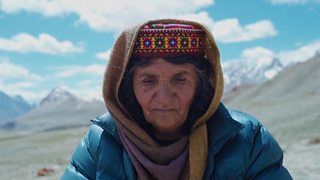
For centuries, Pakistan’s Wakhi shepherdesses have trekked to remote mountain pastures to graze their flocks. The income they generated has been pivotal in transforming their community, helping to pay for healthcare, education and the first road out of their valley. As their way of life dies out, BBC 100 Women joined them on one of their last trips to the pastures.
Our journey up to the Pamir pastures is treacherous. The steep mountain trails wind and twist – one wrong step and you are gone.
The women whistle and holler at the sheep, goats and yaks to stop them straying from the narrow paths and falling down the mountainside.
“There used to be a lot more cattle than now,” says Bano, who is in her late 70s. “The animals would jump here and there and run away. Some would come back and some of them wouldn’t.”

In years gone by, every summer dozens of Wakhi shepherdesses would make this trek through the rugged Karakoram mountains of north-east Pakistan. Carrying their young children on their backs, they would leave the men at home to farm in the Shimshal valley below.
Today, there are only seven of the shepherdesses left.
We walk for eight hours a day through rain, snow and scorching heat. The journey that used to take the women three days takes us five. The elderly shepherdesses are always way ahead of the rest of us as we acclimatise to the altitude.
The threat of landslides is ever present and the thud of the sheep’s hooves vibrates through the ground, bringing rocks and dust crashing down.

It was even harder in the past, before the shepherdesses had thermal jackets and walking shoes.
“We used to wear simple robes. We would be shoeless, and walk into the ice like that,” says 88-year-old Annar.
Afroze, who is now 67, remembers becoming the first woman in the valley to get a pair of shoes.
“My brother gave me two pairs when I got married,” she says. “People used to come just to see them. They would often borrow them and my dress for weddings.”
- BBC 100 Women names 100 inspiring and influential women around the world every year – Michelle Obama and Amal Clooney are on this year’s list, while Melinda French Gates was listed in 2021
- Meet this year’s 100 Women here
“We’ve walked these lands alongside our mothers and grandmothers. Like us, they were shepherdesses, churning butter, and making yogurt,” says Annar, as the women sing and dance.

A cluster of 60 stone houses, abandoned and locked up, hint at a vanishing lifestyle.
As the eldest shepherdess, Annar kisses the door of one of the ranches, says a prayer and steps inside carrying a hotplate with burning leaves.

In the past, to ward off wolves and leopards, they slept on rooftops, even in the harshest weather, made traps and burned fires.
“It was pitch black at night,” says Annar, “We had no light or torch and we wouldn’t even see what we had lost until morning.”
There were personal hardships too. There were no doctors or healthcare facilities in the mountains and she recalls how one summer they buried 12 children in the pastures. Her son and daughter were among them.

Over the years, the shepherdesses became successful businesswomen. “We would collect milk from the animals to make yoghurt and dairy products. We sheared the sheep and made things to take to the village,” says Bano.
The Wakhi community relied on barter and in return for their goods people would build the women huts and houses. Afroze earned enough to build two homes, one in Shimshal and another further away in Gilgit, the nearest city.
“I’ve gained a lot from this place,” she says proudly. “It paid for my children’s weddings. It paid for their education.”

The combination of the women’s shepherding and the men’s farming brought a turning point for the whole community, which was disconnected from the rest of the world until the early 2000s. They helped fund the only road out of the Shimshal valley, linking the village to the Karakoram highway which runs between Pakistan and China.
Journeys that used to take days were reduced to hours and life was transformed. There was better access to healthcare and education and new ideas flooded in.
Bano’s son, Wazir, leads a very different life now. He runs a tourist company organising trekking, mountaineering and cultural tours.
“Our priorities changed when the new road opened,” he says. “That’s when I started my business.”

Fazila, who is 24, owns the first guest house in Shimshal valley, which her father built before he passed away. Her mother was a shepherdess, although her failing health meant she couldn’t go to the pastures this year.
“Our mothers encouraged us to focus on our studies rather than shepherding. They told us not to endure the same hardships that they did,” she explains. “We have the freedom to do what we wish. If I hadn’t pursued my education, I’d be living the same hard life as they did. The cycle would have continued.”
As he drives his jeep through the rugged mountains, Wazir agrees: “Because of our mothers we have doctors, engineers and many other professionals.”

Sitting together sharing memories, the elderly shepherdesses are happy to see their children doing well, but there is a tinge of sadness that the trips to the Pamir pastures are no longer viable.
“Shepherding is more than a job. We feel a strong bond to Pamir. It is beautiful like a flower. It is our treasure,” says Afroze.
And as Annar walks slowly to the graveyard where she buried her children, her eyes fill with tears.
“I want to die in Pamir so I can be buried next to my children,” she says. “When I return to the pastures, I’m returning to them.”
